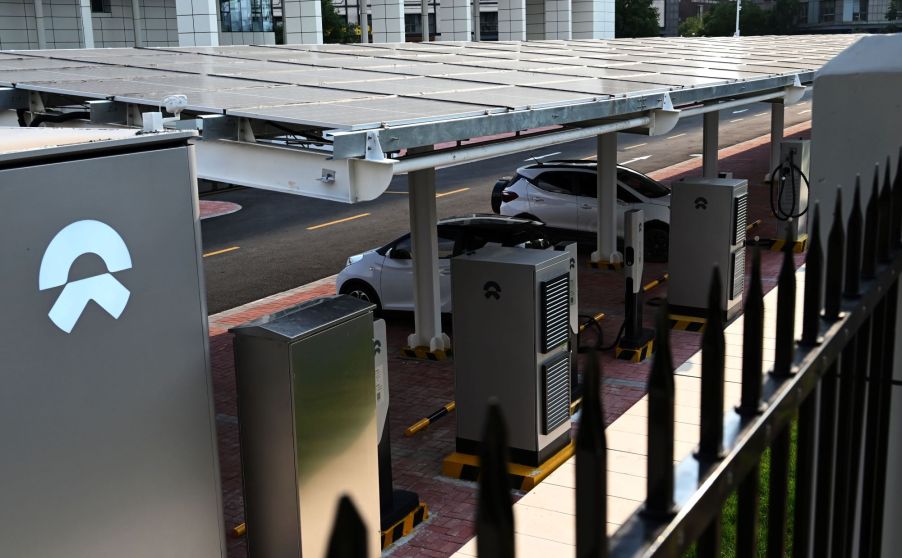
Electric Looking Up: EV Sales Are Rising, and Quick
The auto market has faced several challenges in the past year, mostly due to the coronavirus (COVID-19) pandemic. From material shortages, factory shutdowns, and decreased staffing due to social distancing guidelines, car sales overall have taken a hit. However, despite these tough situations facing most automakers, EV sales have actually soared.
Popular new and used hybrids and EVs

Market difficulties aside, there are plenty of new cars on the horizon. One of the top vehicles to watch is the 2021 Ford Mustang Mach-E. It’s Ford’s first-ever all-electric crossover vehicle. As Car and Driver explains, while the name pays homage to the Mustang Mach-1, it has nothing to do with what most people associate with the Mustang name. However, this EV is still built to perform and deliver a fun ride with 480 horsepower and up to 634 pound-feet of torque for the Performance GT version.
The Toyota Prius still ranks high in used car popularity in terms of basic reliability, says Forbes. The Prius may not be the most enthralling car to drive, but it makes up for that with its stellar fuel economy. It’s also spacious and easy to maintain.
Rising gas prices affect consumer choices
Due to rising gas prices, consumers are looking to EVs as a long-term economical option. As the New York Times reports, gas prices are higher now than at the beginning of the pandemic and are a sign of inflation. Prices are only projected to increase this year and into the near future.
EV sales are rising and thriving
As Kelley Blue Book reports, sales of EVs are surpassing sales of hybrids and plug-in hybrids. In the second quarter of 2021, Americans bought 118,233 EVs compared to just the 33,312 purchased in the first quarter of 2020. That’s a monumental increase of 254.9%. Additionally, in the second quarter of 2021, EV sales increased 201.1% from the first quarter of 2021. Those are big numbers amidst the slew of setbacks facing the auto market.
Interestingly, according to the numbers that Kelley Blue Book mentions, Tesla’s share of the EV market is shrinking. While that doesn’t mean Tesla’s sales are down, it does signal other brands becoming more established in the EV market and for vehicle types that Tesla doesn’t yet produce.
One possible explanation for the jump in EV sales is tax credits. They are a big incentive for consumers to purchase EVs. According to the U.S. Department of Energy, consumers are eligible for a tax credit of up to $7,500 when purchasing certain electric vehicles or plug-in hybrid models. The amount taxpayers will be credited depends on the battery capacity of the vehicle.
These automakers are doing the best in EV sales
According to Car and Driver, which broke down EV sales so far in 2021 by make and model, the top sellers are the Tesla Model Y and Model 3, respectively. After Tesla, the Chevrolet Bolt is enjoying a big jump in sales this year, with numbers up 142% over the first half of last year. Additionally, Chevrolet recently released the Bolt EUV crossover, which should positively impact sales.
Ford is also selling the lauded Mustang Mach-E in high numbers. With the release of its Mach-E GT slated for the fall, those numbers are sure to climb. In addition to Ford, according to Automotive News, Volkswagen Group’s U.S. EV sales have increased 321% in the first six months of 2021. Volkswagen Group is also doing well in the overall global market, with sales up 165% in the first half of the year.
Automakers are aiming for increased EV production
Outside of the Mustang Mach-E, there are lots of other cool new cars and EVs being released. In fact, across the board, automakers are promising to have either a majority of or their entire vehicle lines fully electric in the coming years. Although Tesla has always been a popular option, other automakers are gaining traction in the market, Kelley Blue Book explains.
GM announced that on its path to all-electric vehicles, it plans to release 30 new electric vehicles worldwide by 2025. Daimler, the parent company of Mercedes-Benz, also aims to go fully electric for vehicles by the end of the decade. To further that, Mercedes-Benz plans to have electric vehicles in all of its segments by only 2022.
Governments look to expand infrastructure for EVs
According to CNBC, in the U.S., the Biden administration wants to build a national EV charging system as part of a larger $2 trillion infrastructure plan. President Biden wants to have over half a million charging stations put in place by the end of 2030. This proposed bill hopes to establish these stations as a future need and help lower CO2 emissions in the U.S.
Similarly, McKinsey & Company reports that across the world, countries like Denmark and the U.K. announced that they would ban gasoline-powered vehicles after 2030. With changes like that forthcoming, infrastructures will have no choice but to expand to accommodate EVs. The European Union and the United Kingdom have already changed the International Code Council’s building codes for parking lots with more than 20 parking spaces to have a minimum number of EV charging stations by the beginning of 2025.


